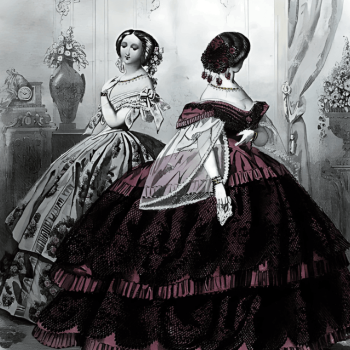IN NEW PLACES
Summer 1841
Waking up early the next day, Vera looked out the window and hastily began to get dressed. There was a thick cherry garden in front of the windows, and she began to wake up Lelya so that she could take a walk with her; but as her sister was such a “sleepyhead,” only managed to run around a lot before she got up.
They had a nice little house and garden here, very simple, overgrown, but so shady that it was great for playing hide and seek. At one end of it stood the white hut of the Ukrainian watchwoman. She had a lot of birds, not only domestic ones but also quails, blackbirds, and pigeons, with which Vera spent whole mornings fiddling around, right up to the lessons, running away to visit the Little Ukrainian. It was nice for her, in her clean whitewashed hut inside and out, in the front garden planted with sunflowers and tall, multi-colored rye flowers; She herself was so pleasant, cheerful, and amusing that Lelya and Vera often listened to her lively speeches (although they did not quite understand them.) She cooked delicious dumplings and baked crumpets (lovely crumpets!) Helena Andreevna enjoyed eating them with her morning tea.
They became very friendly with her and called her mistress, even though their house did not belong to her at all. It was a nice wooden house with several rooms, spacious and bright. Vera lived in the same room with Leonid and Antonia. Lelya slept next to Miss Jeffers. Helena Andreevna had a corner room that doubled as a bedroom and an office, where she often spent entire days and evenings working. She was now much more comfortable than she was in previous camps of Colonel Hahn’s battery. From their high porch, which looked out on the other side of the garden into a large green courtyard, there was a beautiful view of distant fields, with dark oak groves and cherry orchards, from behind which, in the morning, the blue smoke of the huts hidden behind them billowed across the valley most picturesquely. “How intoxicating, how magnificent is a summer day in Little Rossiya,” remarked the author, Nikolai Gogol. Born in the nearby village of Dikanka, Gogol penned a series of stories about the region for his work, Evenings On A Farm Near Dikanka (1832.) “How luxuriously warm the hours,” added Gogol, “when midday glitters in stillness.”[1]
The girls often went on long walks to neighboring farms or to the large orchards of some landowner who had never lived here. Antonia rarely came with them. She had a lot to do, and she liked to stay with Helena Andreevna, who was still often sick. They almost always set off in the same order: Miss Jeffers walked in front, followed by Annushka (who carried Leonid in a wooden cart,) then Masha, and Lelya and Vera ran in all directions, sometimes ahead of them, sometimes behind. During these walks, Vera often gazed at the tall figure of their plain Miss Jeffers. She was amazed at her eternal calm and immobility! How she walked straight, with her nose buried and her slanting eyes fixed on an English book, which she held high in front of her because she was very short-sighted. Occasionally she turned to the girls, especially to Lelya, with some question or remark. Lelya, of course, never listened to her. Miss Jeffers, in turn, did not pay any attention at all to Lelya and continued to stride importantly in front of the girls like a long-legged heron in a swamp. On the way back, a change usually took place. Leonid was in Annushka’s arms, and Masha was bringing back a cart full of plums, cherries, or watermelons from a distant melon patch.
They studied carefully every day; Lelya especially studied English very seriously with Miss Jeffers, and French much more with Antonia. In addition, a music teacher came to her from somewhere three times a week. Despite so many lessons, Lelya still found time to play pranks. All of Lelya’s governesses were true martyrs to their task, and never succeeded in bending her resolute will or influencing her indomitable, obstinate, and fearless nature, with anything but kindness.[2]
Vera could also be a decent minx, but not like Lelya. She never knew how to come up with something as cunning as Lelya, and she was more obedient. In particular, she always obeyed Antonia, for she loved her very much! Before, in Saratov, where she had Baba Lena, many relatives, entertainment, and many acquaintances, she was not as close to her as she now was. Now Vera studied with her much more, and since she had absolutely no one to play with except Lelya, she generally spent much more time with her. When she had time, no one knew how to amuse her with games, and more often with stories, like dear “Tonechka.” That’s what she taught Vera to call her on rare occasions when she spoke to her in Russian, which, however, rarely happened because she managed to convince the girls from an early age that she did not know a word of Russian. Antonia loved children in general so much, and Vera in particular, that for the entertainment of the girls, when playing with them, she knew how to turn into a child herself and sincerely have fun with them. She was amazingly active; always busy from morning to evening, and even during their lessons, she did not stop sewing or knitting.
Once Vera read to her loudly the story of “little Charles,” who, not wanting to go to school, started talking to everyone he met on the way there (a horse, a dog and a bee,) and Antonia, having laid out something very large on the floor, was cutting, crawling on her knees with scissors in her hands and without looking at Vera, corrected her every mistake. Vera was very surprised at how she could accurately know every word without looking at the book.
“It’s not difficult at all,” she answered, smiling at Vera’s question. “You yourself will do the same when you grow up.”
“No, I will never know everything you know!” she answered with the same distrust of her future knowledge that she once expressed to Baba Lena on the way to the orphanage.
“Nonsense! You assured me before that you would never speak French. Do you remember how I assured you that I didn’t know Russian? You were capricious, saying that you would never understand me and would not answer—and I bet that you’d learn very soon. Who was right? You were such a little fool back then that you believed that I had immediately forgotten the Russian language. Do you remember?”
“Yes, I wish I could remember! And how surprised I was when you read Russian fairy tales to us! I was absolutely sure that you only remembered to read, but you don’t understand anything.”
“Do you see how successful my trick was? Now there is no need to deceive you anymore. You yourself don’t speak to me in any other way than in French.”
“Yes, when in French it’s somehow more dexterous!”
“Well, thank God it’s more dexterous. You can speak Russian with everyone, but with Miss Jeffers and I, you need to leave the Russian language aside.”
“So, perhaps, Miss Jeffers is deceiving us,” Vera cried, “maybe she also knows Russian, but she just doesn’t want to talk to us so that we can learn English as soon as possible?”
“What,” the Englishwoman responded from the other room, “what about Miss Jeffers?”
“No,” said Antonia, laughing, “Miss Jeffers really doesn’t know Russian or even French, otherwise I would have told her what’s the matter. Now, since I don’t speak English, we have to call Lelya for help. You still won’t be able to explain it to her yourself?”
Vera shook her head.
They called Lelya, and she instantly told Miss Jeffers what they were talking about. At first, she listened restlessly, squinting her light eyes and throwing her head back high (as usual.) Then she calmed down and began to assure Vera that she could not learn Russian because she was too old for it; and that Vera needed to quickly learn to speak English and sing “pretty English songs.” Vera grimaced, finding absolutely nothing good in her songs. She was terribly tired of Miss Jeffers with her only song about some king who was counting his money in the treasury while the queen was eating bread and honey, and their poor maid went out to hang her laundry in the garden, and suddenly a little black bird flew in and pecked at her nose. Vera (quite rightly) found the song terribly meaningless, and passionately argued that royal maids did not hang out laundry in the gardens, and small birds could not possibly peck a human nose. Nevertheless, by the end of the summer, Vera was already chatting quite a bit in English, not only with Miss Jeffers but also with Lelya.
Helena Andreevna was terribly happy about their success in learning her beloved English. Colonel Hahn said that it was in vain that they were not learning his native language, German.
“Just wait,” he said, “I’ll take you to your grandmother, and she will speak to you in German, but you will not understand! So, both you and your mother will be ashamed.”
“How?” screamed Vera. “Baba Lena won’t speak to us in a foreign language. She may know many languages, but she always speaks Russian.”
“Fool! I’m not talking about your grandmother who lives in Saratov. You have another one—my mother. She is not so far from here. Let’s get together and go visit her.”
“I don’t want!” said Vera. “What other new grandmother is there? I have a grandmother—Baba Lena—I don’t want another.”
Antonia and Helena Andreevna stopped Vera from talking.
“It’s a shame for a big girl to talk so stupidly!” they said. “You don’t know this grandmother yet—papochka’s mother. When you meet her, you will probably love her just like Baba Lena.”
“Never!” Vera protested without hesitation. “How can I love another as much as my dear, dear Baba Lena? Not for anything in the world!”
“Stop it, stupid!” said Helena Andreevna in a serious voice. Despite her stern tone, her wonderful, kind eyes smiled tenderly at Vera.
“Grandma will feed you sweets, you will love her dearly,” Colonel Hahn noted.
Vera was just about to answer him angrily when Antonia took her by the hand and, while Helena Andreevna was talking about something with Colonel Hahn, she took her to another room.
“Shut up!” she said, quietly, and sternly. “Aren’t you ashamed to upset your father?”
“How?” said Vera in surprise.
“By saying that you don’t want to go to his mother. This offends and upsets him! Think, if someone began to scold your mother. It would not be pleasant for you, would it?”
“Yes, but I’m not scolding at all…” Vera muttered in embarrassment. “I’m just telling the truth that I can’t love anyone like I love Baba Lena.”
“Nobody asked you about this, and how can you know this without knowing Grandma Vasilchikova at all?”
Colonel Hahn’s father, Aleksei Hahn, was a lieutenant general originally from Mecklenburg who belonged to an old noble German family.[3]He was appointed commandant of the Kamenets-Podolsk fortress in 1801 and remained in this post for the remainder of his life. His mother, Elizaveta Maksimovna belonged to the Estonian house von Pröbsting. The couple had eight children, four of whom fought in the Patriotic War (the other four were too young.) The senior Hahn also served but died from illness in 1814 before reaching the front.[4] Widowed with eight children, Elizaveta Maksimovna married a second time to Nikolay Vasilyevich Vasilchikov, a hero of the Patriotic War, and brother of Prince Illarion Vasilyevich.[5]
“When you meet her, and see how kind she is, and how much she loves you, then you’ll sing something else,” reassured Antonia.
Vera remained silent. No matter how much Antonia tried to assure her, Vera was still firmly convinced that there could not be another grandmother in the whole world like Baba Lena and that she would never love her father’s mother nearly as much.
Lelya, however, who was surprisingly good at languages, volunteered to learn German and began to carefully study with Antonia three times a week. By autumn she already understood a lot and read completely freely. Colonel Hahn praised her and jokingly called her “a worthy heir to her glorious ancestors…who never knew another language other than German.”
“So, Papochka, they were very uneducated,” Vera said, “because Mamochka says that all educated people should know several languages.”
Colonel Hahn laughed. “I would like you to be a very educated girl,” he said, kissing Vera, “therefore I will ask Antonia Christianovna to study German with you too.”[6]
-
- MOTHERS & DAUGHTERS
- A LANTERN
- CHRISTENING OF THE DOLL
- DASHA & DUNYA
- GRUNYA
- NANNY NASTYA
- NANNY’S FAIRYTALE
- CONFESSION
- IN THE MONASTERY
- PREPARATIONS FOR THE HOLIDAY
- EASTER
- THE DACHA
- THE MELON POND
- MIKHAIL IVANOVICH
- THE WARLIKE PARTRIDGE
- LEONID
- NEW WINTER
- HISTORY OF BELYANKA
- THEATRES AND BALLS
- YOLKA
- REASONING
- ROAD
- CAMP
- IN NEW PLACES
- THE GRAY MONK
- VARENIKI
- THE TRIP TO DIKANKA
- WHAT HAPPENED IN THE DOLL HOUSE
- ANTONIA’S STORY
- “A WINTER EVENING”
- THE BLACK SEA
- CRIME AND PUNISHMENT
- PANIKHIDA
- PRINCE TYUMEN
SOURCES:
[1] Gogol, Nikolai. (tr.) Garnett, Constance. Evenings On A Farm Near Dikanka. Alfred A. Knopf. New York, New York. (1926): 19.
[2] Sinnett, Alfred Percy. Incidents In The Life Of Madame Blavatsky. G. Redway. London, England. (1886): 27.
[3] Reitemeyer, Frank. “Open Questions In H. P. Blavatsky’s Genealogy.” Fohat. Vol. X, No. 2 (Summer 2006): 35-37.
[4] Markelova, L.K. “Notes On The Genealogy Of E.P. Blavatsky: Part III: Major General Alexey Fedorovich Hahn And The Fate Of His Family.” Interregional Information And Analytical Center. (2020.)
[5] Fadeyev, Andrei Mikhailovich. Vospominaniia: 1790-1867. Vysochaishe Utverzhd. Yuzhno-Russkago. Odessa, Ukraine. [Russian Empire.] (1897): Part I: 107.
[6] Zhelihovskaya, Vera Petrovna. How I Was Little. A. F. Devrien. St. Petersburg, Russia. (1898): 182-191.













